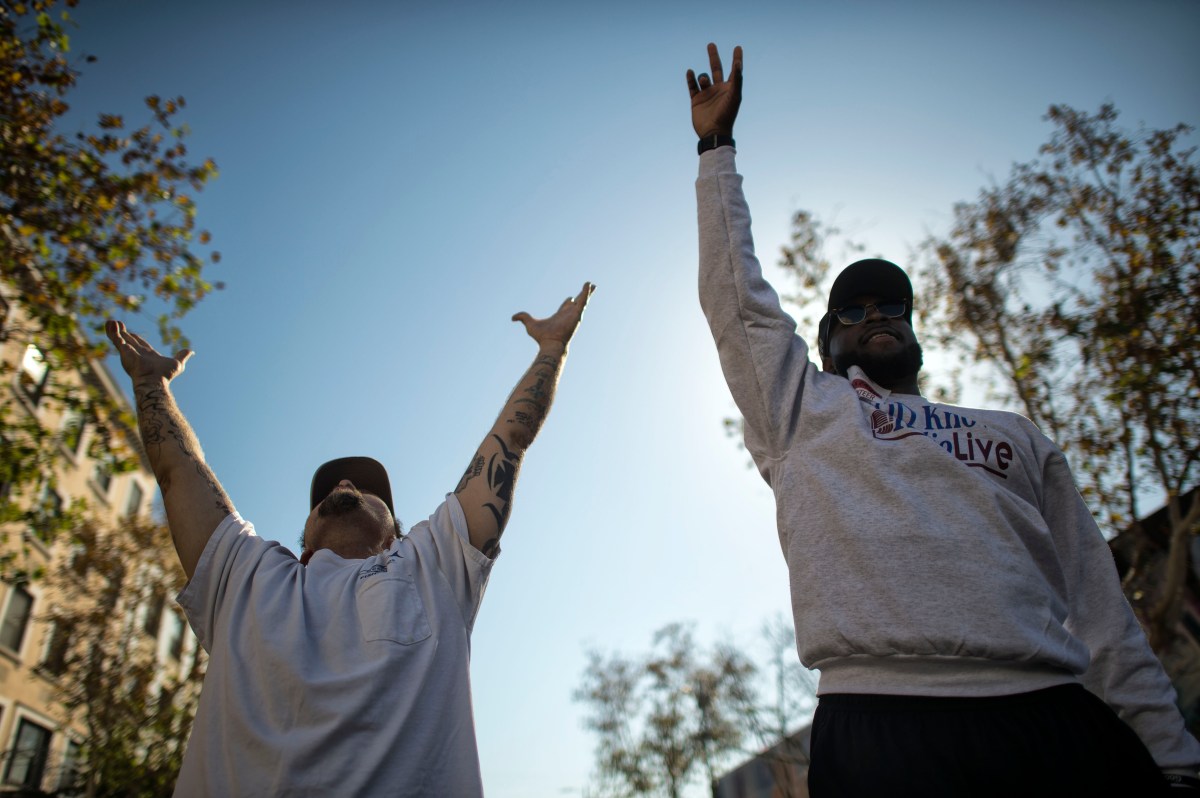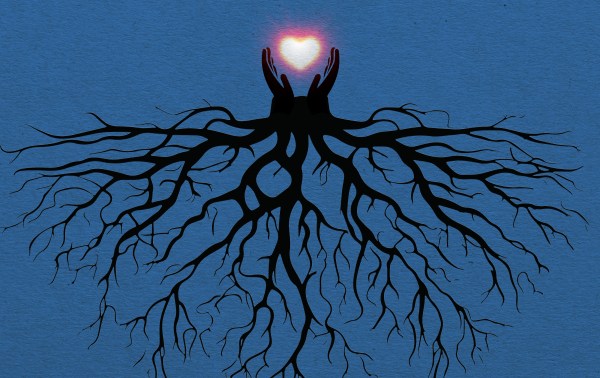Hi and happy Sunday.
Increasing efficiency in the federal government—the stated goal of Elon Musk’s new agency within the Trump administration—is a laudable goal in the abstract, and federal bureaucracies are certainly ripe for reform. Few Americans are likely to argue that point.
But what happens when the impulse to slash runs amok, divorced from any notion of the value of work and how work itself—vocation—is baked into us as humans? Contributing Writer Hannah Anderson wrestles with those questions in this week’s Dispatch Faith, examining the ways in which DOGE has fallen short and how Musk’s impulse to do away with human work perverts elemental truths.
Hannah Anderson: Loving Your Neighbor’s Job

For the last two months, the Trump administration has made it a priority to reshape the federal workforce through budget cuts, grant cancellations, and civil service layoffs, ostensibly in an effort to reduce waste and improve government efficiency. The cuts have led to record-breaking job losses across both public and private sectors and left federal agencies and individual workers reeling as they try to figure out how to move forward. And while none of us is guaranteed employment, the language of “efficiency” and “budget cuts” belies a deeper misunderstanding of work that in many ways, runs afoul of a Christian vision of human vocation.
We often associate “vocation” with a particular kind of skilled training, especially in the trades. But historically, the word has a much more expansive meaning. It comes from the Latin root voc or “to call,” which frames one’s work as a reply to the call of one outside oneself. In the Christian tradition, one’s vocation is deeply tied to one’s very existence, flowing from the same source as our lives and falling under those things (to use the language of the Declaration of Independence) “endowed by [our] Creator.” One’s vocation should be mutually rewarding, serving both the world and flowing from this deeper sense of divine purpose and dignity.
In this way, the right to life, liberty, and the pursuit of happiness is not a call to mere consumption. It is the freedom to respond to God’s calling on your life, whatever it may be. The Founders understood this—however imperfectly—and saw vocational determination as part of the promise of independence. In a 1780 letter to his wife Abigail, John Adams wrote:
I must study politics and war, that our sons may have liberty to study mathematics and philosophy. Our sons ought to study mathematics and philosophy, geography, natural history and naval architecture, navigation, commerce and agriculture in order to give their children a right to study painting, poetry, music, architecture, statuary, tapestry and porcelain.
It would take us generations to extend this right to all those made in God’s image, with chattel slavery being the most egregious example of our blindness (willful or otherwise) to vocation as part of God-given personhood. Slavery is immoral precisely because it supplants God's authority in a person's life with the false authority of someone else. The voice that one is forced to respond to is not the quiet, loving voice of a creator who gave us our gifts to serve the world, but that of an authoritarian ruling class who co-opt other people’s work for their own benefit. In this way, chattel slavery forecloses the very idea of vocation by impeding an individual’s ability to respond to God’s call to perform a particular work in the world.
Protestant Reformer Martin Luther even went so far as to frame our callings as the means by which God himself works in the world:
What is our work in field and garden, in town and house, in battling and in ruling, to God, but the work of children, through which He bestows His gifts on the land, in the house, and everywhere? Our works are God’s masks, behind which He remains hidden, although He does all things.
One of the tragedies of this moment is the degree to which federal job cuts are leveraging people’s vocations as a way to enact the will of a select powerful few, bypassing the representative process almost entirely. That this work is being done through executive order and outside explicit congressional oversight means that the Trump administration is using executive powers not to enact the will of the people as expressed through the congressional delegation sent to Washington, but to reshape the federal government on its own terms. Trump is daring the other branches of government to try to stop him and threatening them when they do. Whether it is the promise to primary Republicans who oppose Trump’s agenda, naming judges “dangerous” when they order fired workers to be reinstated, or strong-arming independent government agencies with police presence, the administration is using workers’ lives and well-being as political pawns.
Not only does this partisan vision harm individual workers, it harms us as a nation insofar as civil service jobs are among the few in our society that are explicitly designated to serve the common good—especially in areas that don’t produce capital or that the market doesn’t necessarily value. While one might immediately think of jobs in the arts or scientific research that do not have immediate application, workers in food health and safety as well as caregiving are also at risk.
I saw just a small example of this recently when my local Veterans Administration hospital, already understaffed, lost 20 positions due to Trump administration policies. While there are clinics scattered around our region, it is the only VA medical center in a 200-mile radius serving the rural population in southwest Virginia and southern West Virginia. Workers who were acting as “God’s masks,” to use Luther’s term, for an underserved population have been unceremoniously stripped of their ability to do so. According to regional news station WSET13, fired workers grieve not simply a position or even income, but the loss of meaningful work: “Every day I woke up just happy to go to work, excited to work with these guys, excited to help them,” said one former employee. “Knowing that what we did made a difference in their lives because they told us that.”
The loss of their work may mean lower quality of care for veterans, who have explicitly served the common good through their military vocations. Even more perversely, some of the workers laid off were veterans themselves.
Rep. Morgan Griffith of Virginia’s 9th Congressional District, a House Freedom Caucus member and die-hard Trump supporter, appeared to distance himself from the cuts, noting that they came through executive action and not congressional budget cuts.
The irony is that Trump rode vocational concerns to re-election, especially among the rural working class. That this same administration shows so little regard for people’s work once elected—and has made it a priority to aggressively and carelessly cut jobs—is revealing. Ostensibly, the cuts are about reducing government inefficiency and waste (yet to be seen). But the claim is especially hard to accept coming from the man behind these cuts, Elon Musk, who also believes that human workers are replaceable with AI. Musk envisions a future where “probably none of us will have a job” due to technological advances and those who do work would simply do it “kinda like a hobby.”
Besides being incredibly patronizing to millions of Americans who engage in routine but rewarding work, Musk misunderstands the essential link between our humanity and the work we do. AI technologies may support human efforts, augmenting and bettering our ability to fulfill our vocations–even freeing us to more intentionally pursue callings that do not have a price tag attached. But they cannot fully replace humans because working to serve others is part of what makes us human. Again, this is the man Trump has deputized as a “special government employee” to make cuts to the federal workforce without congressional authorization.
This is not to argue that the federal government doesn’t need reform or that technology cannot serve and support human vocation. Insofar as state bureaucracy limits our ability to serve others through our unique callings, it needs to be shaped toward freedom and the benefit of all. What we have seen recently, however, is not that. Instead the administration bears the marks of a ruling class playing with people’s vocations as a means to promote partisan agendas and settle personal grievances. If Musk and company eventually achieve their vision of replacing human workers with robots, it will be because they’re already treating people as tools and means to an end.
Whatever hope I have beyond the chaos of the present moment is this: Reality cannot sustain what is fundamentally at odds with itself. If it is true that human vocation is tied to human existence, identity, and purpose, and if the ability to serve others with our unique gifts has been woven into the fabric of reality, it is only a matter of time before movements that abuse human work collapse in on themselves. Writing in the midst of World War II, English essayist and social critic Dorothy Sayers noted how the frugality of the war effort forced correction in a previously consumptive society whose vision of work had been “based on Envy and Avarice.”
People who would not revise their ideas voluntarily find themselves compelled to do so by the sheer pressure of the events which these very ideas have served to bring about ... This attitude we are now being obliged to alter, under the compulsion of war – and a very strange and painful process it is in some ways. It is always strange and painful to have to change a habit of mind; though, when we have made the effort, we may find a great relief, even a sense of adventure and delight, in getting rid of the false and returning to the true.
As my children prepare for their own vocations, I wonder what world they will inherit. My daughter is studying that notoriously inefficient field of art history while my son is navigating the final stages of a college search to enter the field of theoretical physics. My children’s chosen vocations are uncertain right now as canceled funding for the arts and scientific research ripples across these fields. Even still, I continue to encourage them in their pursuits because I know that living fully into who they have been made to be depends, in large part, on contributing to the world through their unique gifts, interests, and abilities. And if they can find a way to do this, they will fulfill John Adams’ vision for a free society: one where our sons and daughters can serve the world however God calls them.
Michael Wear: Faith, Beyond Worship

For our website site today, Michael Wear reviews Heaven Help Us, the new book by former presidential candidate and Ohio Gov. John Kasich. The book, Wear writes, is not the typical faith-and-politics arguments readers may be used to.
Remarkably, I could not find one instance of Kasich referencing the politics of those he highlights. Kasich does not seem to be seeking to advance religious contributions for the sake of a partisan end, or even to show his magnanimity as a politician. Indeed, the diversity of stories he tells reflects, I think, a desperation for religious people themselves to stop allowing politics and its logic to prevent and distract them from taking action themselves to address the problems we face as a society. There are things you can contribute that are more powerful and meaningful in our civic life than your vote. Kasich shows a disregard in this book for partisan ends, but aims to inspire people to do good, regardless of their political disposition.
That does not mean politics is absent from this book. The second thing readers will notice is how the narratives often weave together individual initiative, the power of community, and the capacity of philanthropy and government to partner with, clear pathways for, and scale these projects and initiatives for the common good. Instead of viewing the charitable initiatives of individuals and communities as at odds with the government, Kasich promotes a vision of mutuality. In this way, politics is indeed present—but it’s politics as service, as one way communities solve problems together.
More Sunday Reads
- Political scientist and statistician Ryan Burge broke down a 2022 survey on local church congregations in the U.S. and politics for his Substack this week. He parses lots of questions and data from the survey, but offers insightful analysis about the perhaps surprising responses to the survey prompt I wish my church talked more about political division in the country (emphasis his): “Doing a lot of public facing work on religion has taught me that a significant number of people who aren’t religious or don’t attend church on a regular basis have a misperception about what happens on a Sunday morning. The vast majority of pastors aren’t talking about politics on a regular basis and when they touch on anything that may be in the political realm it’s about topics like racism and income inequality. Both can be discussed in fairly apolitical ways. The other side of this is that huge majorities of congregations just want to avoid politics entirely from the pulpit. They don’t want their pastor or priest to try and discuss the political divides that we are facing. Being around church people my entire life, that’s the clear impression I’ve always gotten. They see Sunday worship as a respite from all the Culture Wars and the talking heads and the political battles that seem to consume our every waking moment.
- In March 2023, 28-year-old Audrey Hale, who identified as a lesbian and sometimes used masculine pronouns, walked into a private Christian school in Nashville—which the shooter attended as a child—and murdered three 9-year-old students and three adults who worked there. Almost immediately, media personalities and cultural commentators claimed the shooter’s motivations were anti-Christian or the result of transgenderism. For Christianity Today, Daniel Silliman writes on a newly released report from investigators that dispels those claims. “Hale did not target the Christian school because it was Christian or fantasize about attacking conservative Christians specifically. Hale attended The Covenant School, which is affiliated with the Presbyterian Church in America, from kindergarten through fourth grade and always recalled the experience with fondness. Hale’s journals and ‘rage storms’ do not contain any allegations of emotional or physical abuse at the private school, and investigators found no evidence of disciplinary problems or even serious conflict with the staff and administration. According to police, ‘Hale considered these years the happiest of her childhood.’ … ‘Hale often remarked her time at The Covenant was the happiest she was during her childhood education,’ police said. ‘Hale felt The Covenant was the perfect place to commit an attack, as it was the perfect setting for her death.’”
A Good Word
For Arc magazine, Daniel Smokler chronicles the centuries-long history of hevrot: small, Jewish volunteer groups “who join together to do good work or promote piety” that largely have fallen by the wayside in modern life. Smokler ends his piece with practical suggestions for reviving them—and the good they could do at a time when such groups are largely disappearing.You know we Dispatchers are suckers for a good story about mediating institutions, and I was encouraged by the history of hevrot. “By the time of the Jews’ expulsion from Spain in 1492, hevrot were a subculture unto themselves, separate and apart from the formal Jewish communal government and distinct from the yeshivot, or rabbinic academies. They were a way of upholding traditional good works but also an experimental space, innovating new devotional practices … By the early modern period, we have evidence of women’s hevrot in central Europe working to bury the dead, care for the sick, and make clothes for the needy. These ‘sacred sororities,’ as Elisheva Carlebach and Debra Kaplan describe them, wrote their own bylaws and kept their own financial records. Like those of Spain, these groups at once performed acts of traditional piety while cultivating new roles for women as executives and treasurers, roles not available to them in normal communal life … Jews brought hevrot with them during their mass migration to the United States. Burial societies, study groups, and charitable circles blossomed in every major city where Jews settled. A new formulation of the hevra, the landsmanshaft, emerged to help emigrants from specific villages settle in the new country. These societies procured cemetery spaces for their members, in keeping with the ancient tradition of securing a dignified burial. But they also taught classes, loaned money, and provided social services. Thousands of landsmanshaftn flourished across the United States, becoming the dominant form of social organization among Jewish immigrants in the late nineteenth century.”







Please note that we at The Dispatch hold ourselves, our work, and our commenters to a higher standard than other places on the internet. We welcome comments that foster genuine debate or discussion—including comments critical of us or our work—but responses that include ad hominem attacks on fellow Dispatch members or are intended to stoke fear and anger may be moderated.
With your membership, you only have the ability to comment on The Morning Dispatch articles. Consider upgrading to join the conversation everywhere.